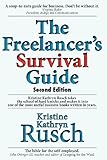Investment and Retirement Planning Advice for Freelance and Freelancers looking for good interest rates on their dollars

Saving For Retirement Isn't Difficult
There are countless blogs and self-proclaimed gurus in the world that are trying tell you how to invest like Warren Buffet, or a Rich Dad, and they tell you what stocks to buy or not buy. Here's the deal: You are better off if you do not know what these gurus are selling. They are filling your head with nonsense. Saving, investing, and preparing for retirement is not that hard. A few simple steps can make your retirement happen, and you don't need to buy books or search through financial reporting sites to figure it out. You are a freelancer, not an investor. The best thing you can do for your retirement is get back to work! To that end, here's a simple breakdown of what you need to do to save for retirement:
- Beat Inflation: An inflation rate for the US Dollar is usually between 1-3%, and you need to make sure whatever investments you have are beating that rate.
- Hands-off Portfolio: Time spent sweating your investment distribution is time spent not earning income at your freelance activity. If you have to spend a lot of time fiddling with your portfolio, you aren't earning income for you. You're just racking up brokerage fees by fiddling. Invest long and broad, and find ways to avoid the need for daily or even weekly brokerage activity.
- Emergency Savings: Maintain a cash cushion of emergency savings that you could live on for six months, kept in an interest-bearing savings account. Because we are freelancers, we need more liquidity than an average worker. We just don't have the stability that comes from a weekly paycheck, when we live from contract to contract.
- Buy a Home: Be sure that you are either a homeowner, or saving up to become one. Owning your own home is a cornerstone in a stable, financially risk-free retirement. Don't skimp on the homeowners insurance, either. Insurance is more important to people who freelance, because we have a high risk income stream.
- Get Good Insurance, and Gym Membership: Get the best health insurance you can afford, and a gym membership. These seem like luxuries sometimes, but they're not. If you want to avoid huge expenses that drain your portfolio and possibly bankrupt you, then get good medical insurance. Engage in the preventative care of a healthy, active lifestyle. Don't have health insurance through a spouse? Join a professional organization or a credit union. These often give discounts to their members for necessary things like life insurance and health insurance.
That's the basics right there. Now, actually accomplishing these things might require a little more insight.

How Do You Beat Inflation?
Every dollar you earn loses value as inflation increases the amount of physical dollars that are available in the banking and financial system. You can't just save for retirement, because every dollar loses value. By investing your dollars, you make sure your money is growing, and fighting back against inflation. Inflation rates fluctuate every year, but generally hang out between 1-3% for a while. So, invest! Put your money to work in the marketplace!
I invest with Vanguard (www.vanguard.com) because they pioneered the index fund, that spreads risk out across many companies with the lowest possible loading and management costs pushed back upon you, the investor. As a freelancer, you can take 3000 dollars and open an account with Vanguard, and feel secure knowing you don't have to sit and stare at financial websites wondering if you have the right stock or the right fund. You are not a speculator. You are investing for your retirement, and the stable of solid, mature, low-cost funds at Vanguard are your bulwark against the noise machine of Financial Gurus and News Outlets.
Even better than just investing in an index fund, a Target Retirement Fund is perfect for an active freelancer. The money is automatically adjusted to protect your investments from wild market swings as time passes, securing a stable retirement for you and your family while you don't have to do anything but freelance. A hands-off retirement plan gives you more of the one precious commodity that you never get enough of: Time.
I recommend making this an IRA to preserve some tax advantages.With an IRA, the money you invest comes from your gross income for tax purposes. This means you get to deduct the contribution from your gross before you figure your taxes. A Roth IRA is even better, because you don't have to pay taxes on the earnings you accumulate in your investments until you deduct them. That means you can accumulate more based on a percentage of your investments. With a Roth IRA, you gain twenty years of accumulated compound interest on what you would otherwise have to pay in taxes!
The only disadvantages to an IRA and a Roth IRA are that you have a cap on what you are legally allowed to invest per year, and you cannot take anything out from them before your 59 1/2 birthday without paying a stiff penalty. It's a good idea to have another fund, separate from your IRA, that you can access in a pinch. Again, go with Vanguard, and go for hands-free mutual funds that offer growth against inflation in the easiest, least time-consuming fashion.
After you open your mutual funds, save up 3000 more dollars because there's something else you need: a Life Annuity. This is like having life insurance, in many ways, except that it is a life insurance plan that pays you a steady income after a certain amount of time has passed. The only thing better than life insurance is life insurance that pays you an income in your retirement.
Invest what you can every month into your Target Retirement Mutual Fund, and your Life Annuity. Automatic deductions are great if you can maintain a stable income through your freelancing. The real key to saving for retirement is earning enough money to be able to save a lot for retirement!
There are as many ways to invest for retirement as there are talking heads on cable. The advantage of this system is that it frees you up to do what you need to do to retire: freelance! Search for clients! Network! Write up contracts! Produce your goods and services! You don't have to lose one iota of sleep or spend more than a moment's glance worrying about your retirement savings. You are ready to go, and are better off ignoring your portfolio on a daily basis.

Have a Cash Cushion
What would you do if your car broke down, you had to go to the hospital, and your mother was calling you, asking for financial help because of a flood in her basement? If you're like many Americans, you pull out your plastic lifeline and charge it at interest, then spend the next few years struggling to pay off the debt.
It is important to have a cash cushion in case of emergency and unexpected expense. Credit Card Debt is the retirement killer. Set aside a little bit every time you get paid into your emergency cash fund. Most people can get by with about ten-thousand dollars. Freelancers, in my opinion, lead more volatile lives, and we get hit hard by economic downturns. For me, and for my family, I keep six months of living expenses in an interest-bearing savings account.
Things happen. The last time I visited the emergency room, my car also broke down, and there was a family emergency. Not only did I have the unexpected expense of an emergency room visit, I had to pay over a thousand dollars to fix my car, and kick in for a large tuition payment for an extended family member during the economic downturn. I nearly wiped out my six months' savings in two weeks! But, I'm glad I had that money sitting there, ready to go, because I'm not going to be paying down the debt on a credit card at 19.5% every month for the next few years. Instead, all I have to do is rebuild my emergency fund, that earns interest with my credit union every month.

Own Your Own Home
Freelancers often get the worst interest rates regardless of our credit histories. We have to pay more for health insurance, life insurance, sometimes even car insurance and rent! Securing a home loan doesn't have to be harder for us than for other people!
The first step is saving up a down payment for your home. I like to make sure my home savings for large purchases are earning the best interest rate possible, and are untouchable for other occasional purchases. Therefore, with my credit union, I purchased Certificates of Deposit to protect my home savings investments. In just a few short years, or perhaps even months, the down payment to your home is secured!
A down payment on a house is generally about 20% of the purchase price. That doesn't mean you can't secure financing for a lower percentage, but remember that every dollar you have to put off as a mortgage is a dollar you will be paying interest on for up to twenty years. If you can increase your down payment to 25% or maybe even 40%, you should be able to secure a better interest rate on your mortgage.
Talk with your financial institution and real estate agent about mortgage options. Don't assume that because you can't demonstrate a stable paycheck week-to-week that you can't get the home of your dreams.
Paying down your mortgage early is also a great idea. If you can afford to pay more every month to reduce your debt, you should do so. The sooner you own your home free and clear, the sooner you can relax knowing you are no longer paying interest on your debt.

Maintaining Your Health is Worth the Price
Health insurance is expensive. For freelancers that have to pay for it out of pocket, it can be a significant burden on our monthly expenses. Often, young freelancers don't secure any sort of health insurance, or spring for just the inexpensive emergency-only insurance, because they perceive themselves as healthy.
Don't fall into this trap. Your body is your only body. Taking care of your body is not only an important investment in your sense of well-being, but it is also a sound financial investment. Sickness is expensive. Preventative maintenance on the only thing you truly own, your body, is a vital part of securing a fiscally-sound, happy, and long retirement.
If you have difficulty securing health insurance, for instance, if you don't have a spouse that offers it through their job, then you need to find it somewhere. The open market is generally not a great place to look. Instead, join professional organizations that offer a discount on health insurance. Failing that, ask your credit union or bank if they have any programs that offer a discounted rate on health insurance. My credit union has negotiated a discount for members, and it's cheaper than what I would get through a professional organization.
A gym membership, as well, is an important investment in your future. (If you use it!) Taking steps to secure your body's health and well-being is one of the best things you can do not only for your sense of well-being and energy and activity levels, but for your pocketbook. Healthy people get sick less, and less severely, than people who do not take care of themselves. In this day and age, one bad medical incident can wipe out savings, decimate retirement portfolios, and even cause homes to go into foreclosure. Simple things done every day, like eating healthy food and going to a gym to work out, are just plain-ol' good ideas.
Speaking of simple things you can do for your health...
Dental health is important. Visit your dentist for all scheduled cleanings, even if you have to scrimp and save to make them happen from time-to-time. Floss daily. Don't let any dental issues wait. If you have a cavity, take care of it immediately. Dental problems do not heal over time, and they do not get less expensive.
Most dentists will offer some discount to people who do not have dental insurance, and many will offer financing options. If you don't have dental insurance, that's no excuse for avoiding your dentist!
(This is one of the rare scenarios where I feel comfortable pulling out plastic if I need to take care of something that's outside of my budget. The interest paid on the credit card is nothing compared to the cost and inconvenience of major dental intervention!)
What does dental health have to do with your retirement planning? An investment in your body is an investment in your future! Think about it, and plan accordingly.
I Am a Freelancer Like You
I get health insurance through a credit union, and I'm saving up for my first house. I have accounts with Vanguard, and an annuity with my credit union. I am not a financial planning professional, but I have been ripped off by some good ones. I learned what I know the hard way, and I hope you can benefit from my experience.













